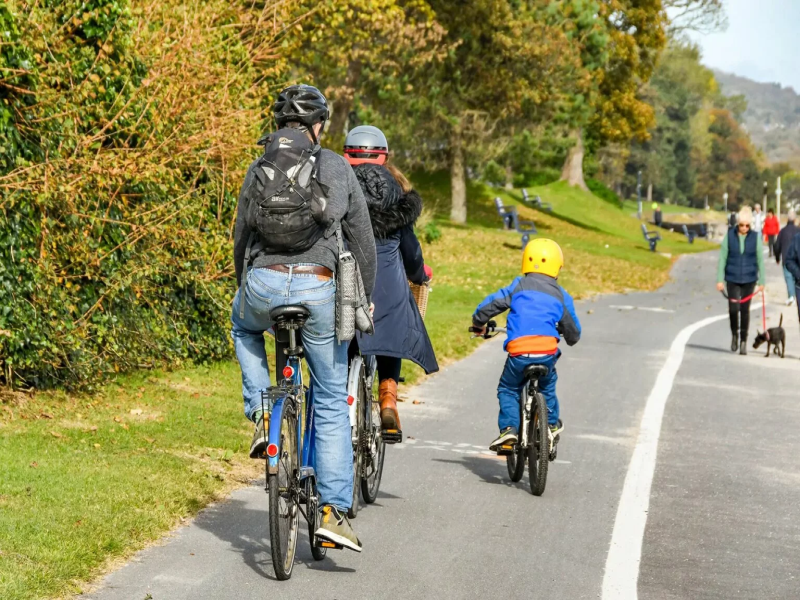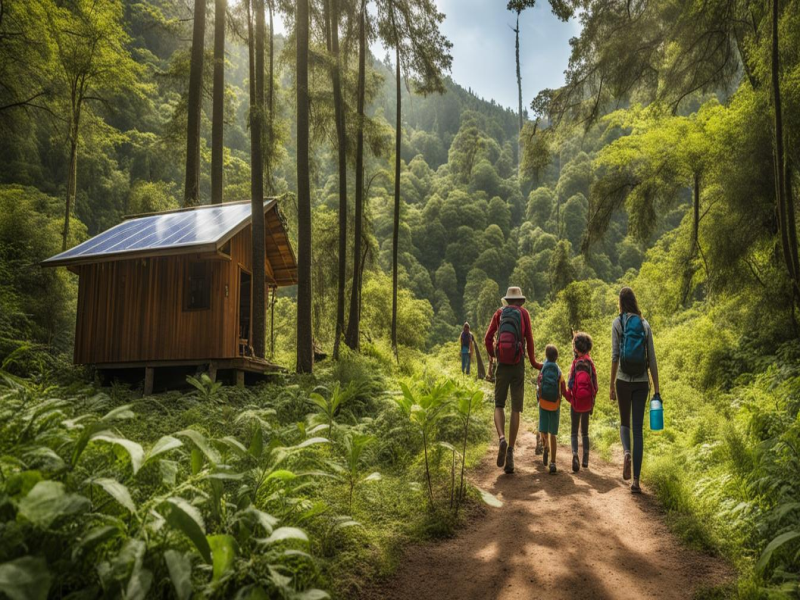Introduction
Traveling is always nice but we shouldn’t ignore the effects that come with the execution of this desire. Mass tourism also poses a great threat to the environment as it support the status quo contributing to climate change physically damaging fragile ecosystems. But nowadays there appears to be a trend towards sustainable tourism – where conscience meets adrenaline! If sustainable practices are incorporated in our travel experience, then we get to see the beauty of the world today without it leaving something for tomorrow’s generation. – Sustainable Living on the Road

The Effects of Tourism on People and the Natural World
The travel industry is one of the biggest culprits when it comes to omissions of greenhouse gases, deforestation, water pollution and waste disposal. Among modes of transport, air travel contributes to emissions of carbon with long haul travel emitting large amounts of carbon in form of carbon dioxide. Furthermore, buying food, rooms, cars, and souvenirs mean overusing resources and using poor practices to exploit locals.
Going Green: The Advent of Sustainable Tourism
Sustainable travel is the act of deciding on the kind of specific actions that are not likely to hurt the environment. Reducing our carbon footprint as well as keeping to the eco-friendly methods used help us in cutting on the use of scarce resources as well as show our support to the local people. However the transition towards sustainable tourism is a change that not only helps the world but enhances travel incredibly.
Sustainable Transportation
Selecting environmentally friendly means of transport is a vital initial process in shallowing up your carbon footprint on the environment. While air travel often seems inevitable, there are various alternatives that can significantly reduce your carbon footprint:
Selecting Environment Friendly Transportations
- Train Travel: Taking a train is more environmentally friendly and in most cases provides an opportunity to enjoy eye-pleasing views. Almost all the countries offer great opportunities to examine different types of terrains on rail transport without leaving a significant negative impact on nature.
- Bus Travel: Bus travel is quite inexpensive and is more suitable than car travel for shorter distances. Choose long-distance bus services that seem to link the company taking them into account the impact of fuel conservationism.
- Carpooling and Ride-Sharing: Pool a ride with other travelers can minimize the number of automobiles on the travel, therefore reducing emission. Instead, turn to carpool apps or look for carpools with others and join them to become at least a part of the carpool.
- Cycling and Walking: Cycling or walking tours are perhaps one of the most eco-friendly means of moving from one place to another. This gives one an opportunity to make a cultural experience, enjoy scenic views or do exercises.
Some Business Strategies to Reduce CO2 Emission While Flying
If air travel is unavoidable, consider the following tips to reduce your carbon footprint:
- Offset Carbon Emissions: Support carbon offsets that finance projects to decrease greenhouse gas emission including afforestation and cleaner energy generation.
- Choose Direct Flights: Several studies have also shown that flight with no stopover emits lesser carbon compared to those with stopovers.
- Pack Light: A lighter plane, translates to lower fuel consumption so pack lightly, and ensure that your luggage weighs as little as possible.
Some simple car choices one is allowed to make to assist in achieving the societal desire of attaining sustainability in the future are;
Sustainable Accommodation
Selecting environmentally friendly establishments is the next sustainable decision that has to be made. This way, you will help businesses that have chosen sustainability as their key values, aligned with environmental protection and social concerns.
Eco-Friendly Accommodations
- Eco-Certified Hotels and Guesthouses: Next time you are organizing a trip or a business meeting, make sure that you are booking at Green Globe, LEED, Green Key or EarthCheck certified facilities. These certifications guarantee compliance with environmental specifications including energy and water efficiency, and wastes minimization.
- Homestays and Vacation Rentals: Home stays or villa stays can often be far more sustainable than basing yourself in a hotel. It enables you to interact with people in their natural communities and environments to have original cultural encounters.
- Camping and Glamping: Tent and tepees or camping and glamping are green and economical with low impact on the environment. Through very careful and appropriate measures while camping one can have the best and quite time under the nature.
Sustainable Business Practices and Tourism, Accommodation and Hospitality Industry
Once you’ve chosen a sustainable accommodation, you can further reduce your environmental impact by adopting the following practices:
- Conserve Water and Energy: Switch off lights and electric appliances that are not in use, have shorter bath sessions and wherever possible try to use the same towels and linen more than once.
- Reduce Waste: Reduce the unnecessary use of plastic by avoiding to have single-use drinking water, toiletries and shopping bags.
- Support Local Businesses and Fair Trade Products: It is recommended that more local restaurants and shops are to be ordered to reduce the carbon emitter of transportation.
In the field of tourism, it is possible to make a conscious-choice about the place to stay; this way the need for affecting balance will be eliminated.

Sustainable Food Choices
In sustainable tourism, the food that is consumed is critical a factor especially on tourism consumption. Therefore, being willing to consciously decide what and how you eat will go along way in lessening your impacts on the environment and more so supporting your immediate community.
Eating Local and Seasonal
- Support Local Farmers and Markets: Choose fresh and local products to avoid gain the impact of emission from transportation vehicles.
- Choose Sustainable Seafood: Choose fish that comes from a good source and which is not species that have been listed under the endangered fishes list.
- Reduce Meat Consumption: Environmental impacts associated with the industry include high emission of greenhouse gases and deforestation. Think about cutting down on the amount of meats you eat or get plant-based meats instead.
Minimizing Food Waste
- Plan Meals and Pack Snacks: To help prevent wasting food, try to plan your meals and try to pack snacks rather than eating out.
- Choose Reusable Food Containers: Eliminate the please any carry home items with disposable packets by carrying your own recyclable containers.
- Compost Food Waste: If possible, the food taken as scraps should be composted so as to generate nutrient-rich soil.
Choosing my foods wisely also help in the formation of better food production methods and thus decreasing my impact on the environment.
Sustainable Shopping
Be conscious of the way you shop when traveling and this will help you minimize your environmental effect. With some level of thinking, you can help certain businesses adopt sustainable practices and tackle the issues of waste.
Mindful Shopping Practices
- Buy Local and Handmade Products: Purchase our locally made ornaments every time you are planning for a party or organizing any event.
- Avoid Single-Use Plastics: Refuse to use plastic carry bags, bottles and forks. Take your own reusable equipment with you to any condition or place.
- Choose Eco-Friendly Packaging: Choose products that come in packages which use little material, or if the material used in packaging can be recycled.
Public support of, and consumer awareness about, Fair Trade and ethical brands
Thus, there is a great opportunity to buy fair trade and ethical brands that will actually positively affect social and environmental situations. Try to look for the Fair-Trade Certified logo, Organic, Rainforest Alliance Certified, etc.
When you choose to make the right shopping choices, you play a part in making the right choices in the world.
Sustainable Experiences
Sustainable travel is not only the process of reducing your carbon footstep; that is also about giving back to the destination. Thus, selecting the kinds of tourism that will make positive valuable impacts on the economy, people and physical environment should be exercised.
Responsible Tourism
- Respect Local Cultures and Traditions: For the women avoid wearing provocative clothes, for any gender, know some words in the native language and respect culture and traditions of the locals.
- Avoid Activities That Harm the Environment: Select those that will cause least harm to the environment like hiking, bird watching and historical or cultural trail tours.
- Support Community-Based Tourism Initiatives: Promote the economic welfare of destinations by patronizing homestays accommodation, local foods and interacting with communities through sustainably approved tours.
Eco-Friendly Activities
- Nature Walks and Wildlife Safaris: Only explore nature without actually affecting it, by absorbing its features, adhering to certain rules and being considerate of wildlife.
- Volunteer Tourism and Eco-Volunteering: Participate in environmental meaningful,” participate in wildlife sanctuaries, marine conservation or social causes related activities.
- Cultural Experiences and Heritage Tours: Discover cultural and historical significance in destinations though safe cultural practices including visiting art galleries, monuments, and fairs.
When you decide on an eco-tourism, you are helping to conserve the environment and the world’s heritage.
I would like to remind readers that sustainability is a process and not an event in tourism. It always possible, to have a big impact on the environment and the communities where you are traveling just by making minor adjustments.
The Power of Individual Actions
Positive change starts with every person. With that in mind, travelling sustainably will be able to help us all minimize our carbon footprint, and embrace responsible travel. Shifts in consumption patterns as simple as choosing an environmentally friendly mode of transport and reducing use of plastics as well as supporting local people makes a big difference.
The Future of Travel as a Sustainable Business
Sustainable tourism is the only way tourism will be in the future. So, development that transforms social equity, environment and sustaining economic returns will help to create a world where the future generations can also experienced wonderful things. To mitigate the adverse impacts of tourism, traveler and tourism industries, and government need to join forces to establish a sustainable environment for the tourism business.
Conclusion
With that being society can experience the world wider in a sustainable manner reducing negative transformation to the environment of the world. Little things matter from using environmentally friendly means to transport goods to buying from companies that practice environmental friendly policies. In other words, the steps we take intentionally and the choices we make will shape the future of existence on this planet.
Therefore, let us begin the process of examining various travel arrangements with the capability to create a positive impact at every travel destination.

References
- International Ecotourism Society: https://ecotourism.org/
- Sustainable Travel International: https://sustainabletravel.org/
- World Wildlife Fund: https://www.worldwildlife.org/
- United Nations World Tourism Organization: https://www.unwto.org/
- National Geographic Society: https://www.nationalgeographic.org/society/
By incorporating these practices into your travel plans, you can become a responsible traveler and help protect our planet for future generations.




